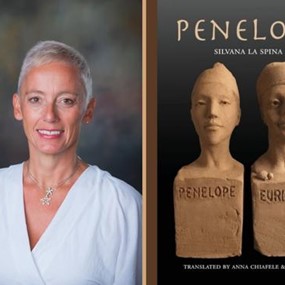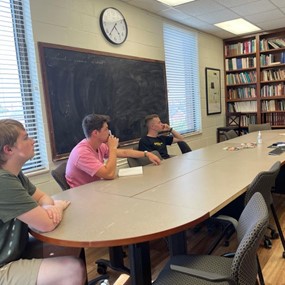Jennifer Lockhart receives NEH fellowship at Fordham University's Orthodox Christian Studies Center

Associate professor of philosophy Jennifer Lockhart recently received an Orthodox Christian Studies NEH Faculty Fellowship at Fordham University. While in residence at the Orthodox Christian Studies Center, Lockhart will be working on a book project that situates Orthodox ascetic practices within a virtue ethical framework.
Lockhart’s project begins by problematizing ascetic virtues (e.g. obedience, humility, chastity, vigilance, solitude, and poverty) within a classical virtue ethical scheme such as that of Aristotle. Virtues, as Aristotle theorizes them, have a certain logical structure. They are excellences that allow us to carry out our characteristic activity well—they allow us to live a flourishing life. But Aristotle recognizes that flourishing requires external preconditions such as friends, health, wealth, and political activity. The virtues, as they are classically understood, therefore contribute to these conditions for their own best exercise. The problem with the ascetic virtues is that they do not appear to have an internal teleology towards these goods. In fact, they can sometimes seem oriented in a different direction. Far from contributing to living a flourishing life, they can seem morbid or, to use Nietzsche's term, "life-denying." Lockhart's book explores the idea that the key to reconciling the classical logic of virtue with Christian ascetic practices is the Orthodox understanding of theosis. It is by death itself that Christ tramples down death. The ascetic virtues, therefore, are the virtues of theosis since they display the same paradoxical nature as Christ’s victory—in imitation of Christ, ascetic practices are a path directly through the shadow of death into true life.
Lockhart received a PhD in philosophy from the University of Chicago and has held an Andrew W. Mellon Postdoctoral Fellowship in the Humanities at Stanford University. Her research deals with contemporary ethical issues through a sensitive engagement with the history of philosophy. Her published work is in conversation with figures such as Plato, Kant and Kierkegaard. She has written on topics including moral luck, constitutivism (in relation to ethical non-cognitivism), practical necessity and moral worth.
The Orthodox Christian Studies NEH Faculty Fellowship is supported by a grant from the National Endowment for the Humanities. Fellows are invited to deliver a public lecture at Fordham University on their research project.
Past fellows have contributed seminal research to the fields of Byzantine history, Orthodox Christian tradition and contemporary geopolitical issues.
Tags: Philosophy Faculty






